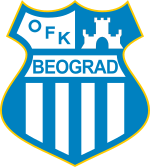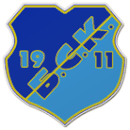OFK Belgrade
| OFK Belgrade | |||

|
|||
| Basic data | |||
|---|---|---|---|
| Surname | Omladinski Fudbalski klub Beograd (professional football team) |
||
| Seat | Belgrade , Serbia | ||
| founding | September 1, 1911 (as BSK - Beogradski sportski klub ) |
||
| Colours | Blue & white | ||
| president |
|
||
| Website | ofkbeograd.co.rs | ||
| First soccer team | |||
| Head coach |
|
||
| Venue | Omladinski stadium | ||
| Places | 19,100 | ||
| league | Srpska Liga Belgrade | ||
| 2015/16 | 15th place ( SuperLiga ) | ||
|
|
|||
OFK Belgrade (full official name in Serbian : Омладински фудбалски клуб Београд, club Omladinski Fudbalski Beograd; German : youth football club Belgrade), usually as OFK known, the football department of OFK Belgrade, a Serbian sports club from the capital Belgrade , in the Srpska Liga , the third highest division in Serbian football.
The club was founded in 1911 under the name BSK , which was the most successful football club in the Kingdom of Serbia and later in the Kingdom of Yugoslavia with five championships . These five championships make him the third most successful club in the Serbian and Yugoslav championships to this day, after the dominant clubs Red Star Belgrade and Partizan Belgrade . After two renaming, the association was given its current name in 1957. OFK Belgrade celebrated its greatest successes of the post-war period in the 1950s and 1960s, when the club was twice runner-up in the 1st Yugoslav League and four times cup winners .
In European football, the club reached 1,963 in the UEFA Cup Winners' Cup semi-final, but lost to the eventual winners Tottenham Hotspur . The last time the Belgrade team reached a European quarter-finals was in 1973 when they lost to Twente Enschede in the UEFA Cup . Finally, there was a long dry spell, both nationally and internationally. The club's last major success was reaching the national cup final in 2006.
history
1898–1911: The prehistory
The beginning of 1911 there was a dispute between several players of 1907 incurred football department , founded in 1898 in Belgrade Fencing Association Srpski mač ( dt. Serbian sword) and the club president Radivoje Novaković, of the host a friendly match against Hask did not agree. The club from Zagreb , which was founded in 1903 and was then subordinate to the Hungarian Football Association , was prohibited by the association from playing international matches. The reason was a law from 1907, according to which only Hungarian should be spoken at all train stations in what was then Croatia and Slavonia , which belonged to Austria-Hungary , which the Croatian population, supported by the Serbian , opposed in the regions.
The Czech Miloš Ekert, who had previously moved from HAŠK to Srpski mač , stayed in contact with his former teammates and saw this as an opportunity to play a game between these two teams. The players of the Srpski mač agreed, in contrast to the club president, who rejected this proposal. He saw no point in this because he believed that his club was much weaker than the HAŠK, which was in fact already an established club. The club's management decided that all players who went to Zagreb anyway should be excluded from the club due to undisciplined behavior. Aware of this, but motivated by this challenge, numerous players, accompanied by some SK Soko players, drove to Zagreb to meet and pretended to be the national team of the Kingdom of Serbia .
Once there, in May you had two encounters within two days, both of which were clearly lost. The Zagreb newspapers of that time praised the Serbian team for their efforts and their courage to challenge the better and clearly experienced HAŠK , while at home they were exposed to great criticism for their irresponsible solo efforts , mainly because they did not appear under the name Srpski mač , but rather themselves as the national team of the Kingdom. At the same time, of course, the style of play was also criticized. Ultimately, the dissidents were banned from the clubs that decided in July 1911 to found a new football club, which would eventually lead to the creation of OFK Belgrade.
1911–1941: The founding years
At the first inaugural meeting of the former players Srpski mač, was Andre Jovic as club president, Danilo Stojanović , better known by his nickname Cika Daca, one of the greatest pioneers of Serbian football , and Jevrem Pantelić as vice president and Dušan Milošević determined as Vereinssekräter. As treasurer was Miloš Ekert selected, who was also one of the first foreign players in the country, and received his first name on the proposal from the club. Finally, on September 1, 1911, the club was officially founded under the name BSK - Beogradski sportski klub (Belgrade Sports Club). The first pitch of the BSK was on a former horse racing track , where the technical faculty of the University of Belgrade is today, as well as the Hotel Metropol . The club played its first encounter on October 13, 1911 against Šumadija 1903 , a club from the city of Kragujevac , whose founding had also previously been carried out by Danilo Stojanović , which they won 9-1. Between 1923 and 1941 the BSK won five championships and became the most successful football club in the Kingdom of Serbia and later in the Kingdom of Yugoslavia .
1945 – today: golden years and dry spell
Between 1945 and 1950 the club was called Metalac, then again BSK . In 1957 he was given the current name OFK Belgrade. In the 1950s and 1960s the club celebrated its greatest successes in Yugoslav football. At the time, the club played a particularly attractive and successful football, which is why it was nicknamed Romantičari ("The Romantics"). He was runner-up in 1955 and 1962 and cup winners in 1953, 1955, 1962 and 1966, but was still overshadowed by the big Belgrade city rivals Red Star and Partizan .
In 1963 OFK Belgrade reached the semi-finals of the European Cup Winners' Cup , but was subject to the eventual winner Tottenham Hotspur . Another European quarter-finals followed in 1973 , this time they failed in the UEFA Cup to Twente Enschede .
Finally, there was a long dry spell, both nationally and internationally. In the 1980s and 1990s, the club experienced an era of lack of consistency. The OFK Belgrade only played in the UEFA Intertoto Cup in 2003 and 2004 and again in the UEFA Cup in 2005 and 2006 . The club's last major success was reaching the national cup final in 2006. In the 2009/2010 season, thanks to a third place, the club qualified for the UEFA Europa League .
Stadion
The Omladinski stadium is the home stadium of OFK Belgrade. It is expected to be completely renovated soon to meet UEFA safety standards for national and international football events.
Fans
The fans of OFK Belgrade call themselves “Plava Unija”, which translates as blue union. OFK, like many other Serbian clubs, has had to struggle with spectator problems in recent years, which is mostly due to the outdated stadiums. An example of this is that the OFK has not registered more than 5,000 spectators in the last five years (except for games against Red Star & Partizan). This mark was placed in the Kupa Srbije semi-final second leg against Vojvodina Novi Sad in the 2012/13 season. The last big visit comes from the Europa League qualifying second leg against Galatasaray Istanbul in the 2010/11 season, when around 13,000 fans found their way into the stadium.
Trainer
-
 Ljubiša Broćić (1947–1950)
Ljubiša Broćić (1947–1950) -
 Zoran Milinković (2012-2013)
Zoran Milinković (2012-2013)
player
|
1930-1950 |
1950-1970 |
1970-1990 |
1990-2010 |
Sporting successes
Soccer
-
Yugoslav runner-up (2):
1955, 1964 -
Yugoslav Cup Winner (4):
1953, 1955, 1962, 1966
European Cup balance sheet
| season | competition | round | opponent | total | To | Back |
|---|---|---|---|---|---|---|
| 1962/63 | UEFA Cup Winners' Cup | 1 round |
|
5: 3 | 2: 0 (H) | 3: 3 (A) |
| 2nd round |
|
7: 4 | 5: 1 (H) | 2: 3 (A) | ||
| Quarter finals |
|
6: 4 | 2: 0 (H) | 1: 3 (A) | ||
| 3-1 in Marseille | ||||||
| Semifinals |
|
2: 5 | 1: 2 (H) | 1: 3 (A) | ||
| 1963/64 | Exhibition cities cup | 1 round |
|
3: 4 | 1: 2 (A) | 2: 1 (H) |
| 0: 1 in Trieste | ||||||
| 1964/65 | Exhibition cities cup | Semifinals |
|
2: 4 | 2: 2 (A) | 0: 2 (H) |
| 1966/67 | UEFA Cup Winners' Cup | 1 round |
|
1: 6 | 1: 3 (H) | 0: 3 (A) |
| 1968/69 | Exhibition cities cup | 1 round |
|
7: 4 | 1: 3 (A) | 6: 1 a.d. (H) |
| 2nd round |
|
2: 1 | 1: 0 (H) | 1: 1 (A) | ||
| 3rd round |
|
3: 3 ( a ) | 3: 1 (H) | 0: 2 (A) | ||
| 1971/72 | Uefa cup | 1 round |
|
6: 3 | 4: 1 (H) | 2: 2 (A) |
| 2nd round |
|
1: 5 | 1: 1 (H) | 0: 4 (A) | ||
| 1972/73 | Uefa cup | 1 round |
|
5: 3 | 2: 2 (A) | 3: 1 (H) |
| 2nd round |
|
( a ) 5: 5 | 3: 4 (A) | 2: 1 (H) | ||
| 3rd round |
|
3: 1 | 0: 0 (H) | 3: 1 (A) | ||
| Quarter finals |
|
3: 4 | 3: 2 (H) | 0: 2 (A) | ||
| 1973/74 | Uefa cup | 1 round |
|
( a ) 2: 2 | 2: 1 (A) | 0: 1 (H) |
| 2nd round |
|
1: 8 | 0: 3 (A) | 1: 5 (H) | ||
| 2003 | UEFA Intertoto Cup | 1 round |
|
5: 3 | 1 | 5: 3 a.d. (A) |
| 2nd round |
|
3: 4 | 0: 1 (A) | 3: 3 (H) | ||
| 2004 | UEFA Intertoto Cup | 2nd round |
|
5: 1 | 3: 1 (H) | 2: 0 (A) |
| 3rd round |
|
1-0 | 0: 0 (A) | 1: 0 (H) | ||
| Semifinals |
|
1: 5 | 1: 3 (H) | 0: 2 (A) | ||
| 2005/06 | Uefa cup | 2nd qualifying round |
|
2: 2 ( a ) | 2: 1 (H) | 0: 1 (A) |
| 2006/07 | Uefa cup | 2nd qualifying round |
|
2: 5 | 1: 0 (H) | 1: 5 (A) |
| 2008 | UEFA Intertoto Cup | 2nd round |
|
2: 3 | 1: 0 (H) | 1: 3 (A) |
| 2010/11 | UEFA Europa League | 2nd qualifying round |
|
3: 2 | 2: 2 (H) | 1: 0 (A) |
| 3rd qualifying round |
|
3: 7 | 2: 2 (A) | 1: 5 (H) | ||
Overall record: 57 games, 22 wins, 11 draws, 24 defeats, 91: 101 goals (goal difference −10)

